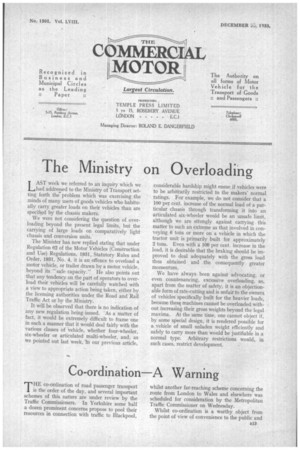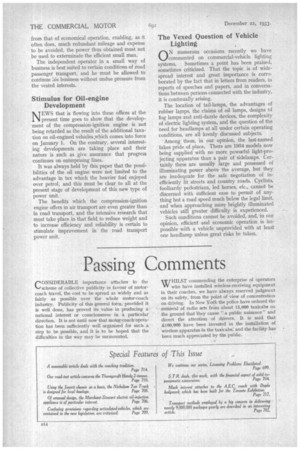Co-ordination —A Warning
Page 19

Page 20

If you've noticed an error in this article please click here to report it so we can fix it.
THE co-ordination of road passenger transport is the order of the day, and several important schemes of this nature are under review by the Traffic Commissioners. In Yorkshire some half a dozen prominent concerns propose to pool their resources in connection with traffic to Blackpool, whilst another far-reaching scheme concerning the route from London to Wales and elsewhere was scheduled for consideration by the Metropolitan Traffic Commissioner on Wednesday.
Whilst co-ordination is a worthy object from the point of view of convenience to the public and sts from that of economical operation, enabling, as it often does, much redundant mileage and expense to be avoided, the power thus obtained must not be used to exterminate the efficient small man.
The independent operator in a small way of business is best suited to certain conditions of road passenger transport, and he must be allowed to continue his business without undue pressure from the vested interests.
Stimulus for Oil-engine Development
NEWS that is flowing into these offices at the present time goes to show that the development of the compression-ignition engine is not being retarded as the result of the additional taxation on oil-engined vehicles,,which comes into force on January 1. On the contrary, several interesting developments are taking place and their nature is such as give assurance that progress continues on enterprising lines.
It was always held by this paper that the possibilities of the oil engine were not limited to the advantage in tax which the heavier fuel enjoyed over petrol, and this must be clear to all at the present stage of development of this new type of power unit.
The benefits which the compression-ignition engine offers in air transport are even greater than in road transport, and the intensive research that must take place in that field to reduce weight and to increase efficiency and reliability is certain to stimulate improvement in the road transport power unit.
The Vexed Question of Vehicle • Lighting
ON numerous occasions recently we have commented on commercial-vehicle lighting systems. Sometimes a point has been praised, sometimes criticized. That the topic is of widespread interest and great importance is corroborated by the fact that in letters from readers, in reports of speeches and papers, and in conversations between persons connected with the industry, it is continually arising.
The location of tail-lamps, the advantages of rubber lamps, the claims of oil lamps, designs of fog lamps and anti-dazzle devices, the complexity of electric lighting system, and the question of the need for headlamps at all under certain operating conditions, are all keenly discussed subjects.
Among them, in our opinion, the last-named takes pride of place. There are 1934 models now being supplied with no more poworful light-projecting apparatus than a pair of sidelamps. Certainly these are usually large and possessed of illuminating power above the average, but they are inadequate for the safe negotiation of inefficiently lit streets and country roads. Cyclists, foolhardy pedestrians, led horses, etc., cannot be discerned with sufficient ease to permit of anything but a road speed much-below the legal limit, and when approaching more brightly illuminated vehicles still greater difficulty is experienced.
Such conditions cannot be avoided, and, in our opinion, efficient and economic operation is impossible with a vehicle unprovided with at least one headlamp unless great risks be taken.












































































